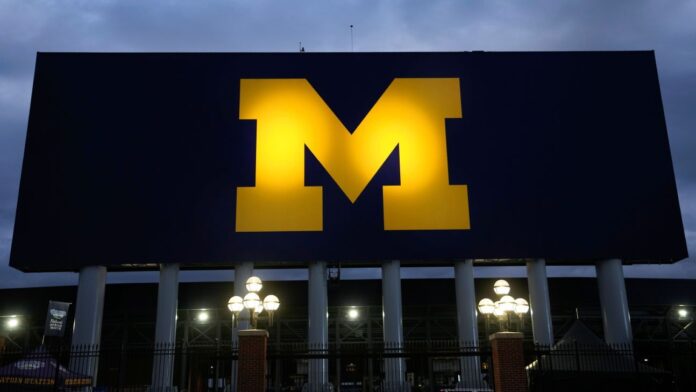A private capital plan that would have infused $2.4 billion into Big Ten athletic departments has been paused in the face of opposition from league members Michigan and USC.
UC Investments, which is tied to the pension fund of the University of California, announced Monday that it would wait for “unity” among conference schools before proceeding.
“We remain convinced that the unity of the 18 Big Ten university members is the key to the success [of the deal],” UC Investments said in a statement. “We also recognize that some member institutions need more time to assess the benefits of their participation. UC investments likewise requires some additional time to complete our due diligence as recent developments unfold and we continue to engage with the conference.”
The plan called for the league to spin off a new entity, Big Ten Enterprises, which would house all league-wide media rights and sponsorship deals. In exchange for the $2.4 million, UC Investments would receive a 10-percent stake in Big Ten Enterprises.
The deal would also extend the league’s grant of rights an additional 10 years until 2046.
The $2.4 billion would be distributed to league schools on a tier basis, with all the programs receiving a minimum payment in the $100 million range. Some larger programs would receive higher payouts.
Despite being in the middle of a seven-year, $7 billion media rights package that runs through 2030, numerous schools are in need of money due to soaring operational costs, debt on stadium construction and renovations and revenue sharing with athletes.
The Big Ten itself and as many as 16 schools supported the deal. Big Ten commissioner Tony Petitti personally lobbied schools to back the plan. UC Investments called the Big Ten’s process “rigorous and highly professional.”
Michigan and USC would not waver though, with the Boards of Regents/Trustees of each school saying the plan was fiscally unsound and the concept of selling a league asset at odds with their fiduciary responsibility.
The schools also stated that it would be a band-aid on a larger issue of runaway expenses, with Michigan Regent Mark J. Bernstein dubbing it a “pay day loan” at a meeting last month.
On Monday, Michigan Regent Jordan Acker told SiriusXM radio that the school remained opposed and found it nearly impossible to sign a Grant of Rights extension for 21 years.
“[That] is a pretty big thing to do when you don’t know what college football is going to look like four or five years from now,” Acker said.
In response to news reports last week that the league office and 16 schools might proceed with the deal even without Michigan and USC, Acker said the Wolverines would explore all options for the future, including leaving the league and going independent. Michigan was a founding member of the conference in 1896.
“Michigan has a lot of options,” Acker said. “The possibility of independence for football is certainly something that has to be considered. Not today, but at the end of the Grant of Rights [in 2036].
“I think it’s something you have to think about,” Acker continued. “Not because we want to leave the Big Ten Conference [but] because the commissioner’s office has made it enormously clear that they’re going [proceed] without us. That would be the end of Michigan, as far as I can see, in the Big Ten Conference.”
The loss of one of the Big Ten’s most prominent brands, biggest television draws and most successful programs in both football and men’s basketball, would have shook the league and college athletics.
Acker noted that the league has repeatedly expanded its ranks — now 18 schools stretching from Southern California to New Jersey — in search of additional revenue, only to continue to need more and more money.
Thus far, neither the Big Ten nor UC Investments has been able to convince the trustees that the new plan could solve that problem.
The money infusion was believed to be acutely needed for schools who are struggling to pay down debt on new construction and budgeting for direct revenue ($20.5 million this year and expected to rise annually) to athletes.
Illinois spent $20 million, or 11.8 percent of its expenditures in 2023-24, on debt service. Ohio State laid out $33.7 million, or 11.5 percent of its budget.
At most schools, the decision on the capital plan fell to university presidents and athletic directors. Neither USC nor Michigan currently has a president, but both have powerful Boards that oversee the operations of the schools.
Michigan’s 8-person BoR is publicly elected, which members say requires significant fiduciary responsibility and public accountability. That, they believe, differs from presidents and athletic directors, who are often on the job for just a short period of time.
UC Investments has not given up on the plan. In its statement it said it will continue to work with Petitti and the league to “allow all [Big Ten] members to evaluate the benefits of our potential investment in Big Ten Enterprises.”
